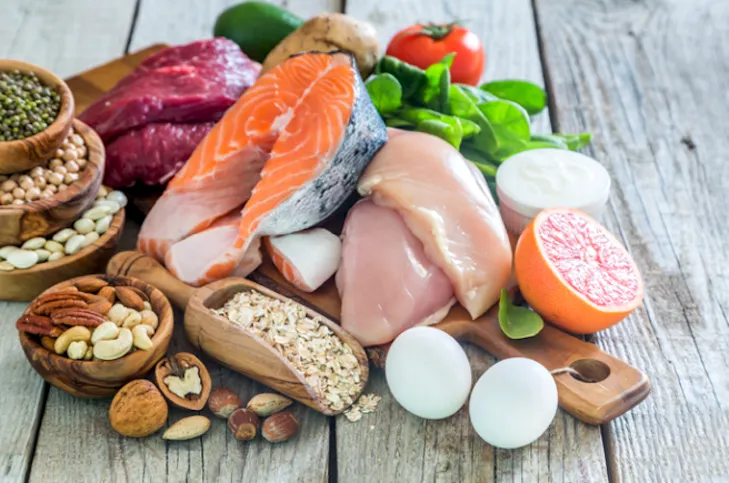Considering a homemade diet for your beloved canine companion? It’s a journey best embarked upon with expert guidance. While countless recipes for homecooked dog meals abound online, not all are created with a veterinary nutritionist’s oversight to ensure a nutritionally complete and balanced diet. This crucial step is often why some owners opt for pre-made fresh food to mitigate risks. To truly provide a vet-recommended homemade dog food recipe, consulting your veterinarian or a board-certified veterinary nutritionist is not just an option, it’s a necessity.
The American College of Veterinary Nutrition (ACVN) underscores that a dog’s nutritional requirements are highly individualized, depending on their age, size, health status, and breed. Furthermore, for certain dogs, a homemade diet might be unsuitable or even detrimental. Dr. Jerry Klein, AKC chief veterinarian, cautions against homemade diets for puppies under one year old, explaining that inadequate calcium and phosphorus intake can lead to significant bone abnormalities. Pregnant and lactating dogs also have unique dietary needs that generic internet recipes often fail to address adequately. Before you dive into the specifics of a homemade dog food recipe, ensure you have a professional by your side to tailor the diet to your dog’s unique needs, especially if you are looking for a truly vet recommended homemade dog food recipe.
The ABCs of a Balanced Homemade Dog Food Diet
Understanding the foundational elements of a balanced homecooked diet is essential for informed discussions with veterinary experts. These are the critical ingredients that contribute to your dog’s overall health and well-being. Getting these right is key to any successful vet-recommended homemade dog food recipe. Many commercial options exist, like those that provide blue diamond puppy food for younger dogs, but homemade requires precise measurement and ingredient selection.
Protein: The Building Block of Health
Proteins are vital for dogs, providing essential amino acids their bodies cannot produce. These amino acids are crucial for creating glucose, which converts into energy. High-quality protein sources include skinless, boneless chicken and turkey, beef, lamb, and pork in controlled amounts. Certain fish like salmon, whitefish, herring, walleye, flounder, and Arctic char are also excellent options. Always ensure bones, excessive fat, and skin are removed before cooking and serving.
Fats and Fatty Acids: Energy and Skin Health
Fats are concentrated energy sources, primarily from animal fats and plant seed oils. A healthy diet must supply essential fatty acids that dogs’ bodies don’t synthesize. These fats are indispensable for cell structure and function, maintaining healthy skin and a lustrous coat, and enhancing food palatability. Plant-based oils such as corn, soybean, canola, and flaxseed oil, along with fish oil, are excellent sources of these beneficial fatty acids. For adult dogs, maintaining a healthy weight is also important, and understanding fat content is crucial, just as it is for products like blue buffalo small breed adult formulas.
Carbohydrates: Fuel for Daily Activities
Carbohydrates supply a significant portion of a dog’s energy, encompassing sugars, starches, and dietary fibers. Good carbohydrate sources for dogs include cooked rice, pasta, oatmeal, and quinoa. These provide sustained energy for their active lifestyles.
Fiber: Essential for Digestive Wellness
Fiber is critical for a dog’s gastrointestinal (GI) system to function optimally and to help prevent obesity. Including adequate fiber in a homemade dog food recipe is paramount for digestive health. Excellent sources of fiber include carrots, pumpkin, apples, dark leafy greens, brown rice, and flaxseed. If your dog has specific digestive issues, a vet-recommended homemade dog food recipe might include particular fiber types, similar to specialized digestive care dog food options.
 Fresh vegetables, meat, and rice prepared for a balanced dog meal.
Fresh vegetables, meat, and rice prepared for a balanced dog meal.
Vitamins: Micro-Nutrients for Growth and Maintenance
Vitamins are indispensable for canine growth and maintenance. Both deficiencies and excessive quantities of vitamins can lead to serious health issues. A balanced homemade diet must include a precise array of vitamins.
Key vitamins and their sources include:
- Vitamin A: Carrots, pumpkin.
- B Vitamins: Liver, green vegetables, whole grains.
- Vitamin C: Fruits and vegetables, organ meat.
- Vitamin D: Liver, fish, beef.
- Vitamin E: Leafy green vegetables, liver, bran, plant oils.
- Vitamin K: Fish, leafy green vegetables.
- Choline: Liver, fish, meats, egg yolks.
Minerals: The Foundation of Strong Bones and Systems
There are 12 essential minerals that dogs require for various bodily functions, from bone strength to immune support.
- Calcium and Phosphorus: Tofu, green beans, broccoli, cauliflower (calcium); meat, eggs (phosphorus). Essential for strong bones and teeth.
- Magnesium, Potassium, Sodium, and Chloride: Fruits, vegetables, whole grains. Crucial for nerve impulse transmission, muscle contraction, and cell signaling.
- Sulfur: Meat, fish, molasses. Supports healthy skin, coat, and nails.
- Iron: Red meats, poultry. Vital for red blood cell production and a robust immune system.
- Iodine: Dairy, kelp, seafood. Promotes a healthy thyroid.
- Zinc: Eggs, lamb, liver, brewer’s yeast. Supports the immune system, healthy skin, and coat.
- Selenium: Meat, vegetables, seafood, brown rice. Boosts the immune system.
- Copper: Whole grains, seeds, seafood. Essential for healthy bone growth.
Water: The Overlooked Essential Nutrient
Often overlooked, water is arguably the most critical ingredient in a healthy dog’s diet. No dog food, homemade or commercial, contains enough water to meet your dog’s hydration needs. Always ensure your dog has access to clean, fresh water.
Making the Transition to Vet-Recommended Homemade Dog Food
Switching your dog to a homemade diet is a significant decision that requires careful planning and execution. Following these steps will help ensure a smooth and healthy transition for your pet.
Consult a Veterinarian or Veterinary Nutritionist
This is the cornerstone of a successful transition to a homemade diet. Your veterinarian or a board-certified veterinary nutritionist will assess your dog’s age, size, health history, and any existing medical conditions. They can then help you identify or formulate a high-quality, vet-recommended homemade dog food recipe tailored to meet your dog’s specific nutritional needs. Their expertise is invaluable in preventing nutritional deficiencies or excesses that could harm your dog.
Sourcing Quality Ingredients
Just as you would for your own food, pay close attention to the source, expiration dates, and labels of ingredients for your dog’s homemade meals. Opt for fresh, high-quality ingredients to ensure maximum nutritional value and safety. Understanding ingredient quality is paramount, much like when discerning options for commercial foods such as coles dog food.
Gradual Dietary Switch
Any change in a dog’s diet, whether to a new commercial food or a homemade one, should be done gradually. A rapid switch can upset your dog’s gastrointestinal system, leading to digestive issues like vomiting or diarrhea. Over a period of at least five to seven days, gradually mix increasing amounts of the new homemade food with the old food, allowing your dog’s system to adjust. This slow introduction helps prevent digestive upset and ensures a smoother transition.
Adhering Strictly to the Vet-Recommended Recipe
Once you have a vet-recommended homemade dog food recipe, it is crucial to follow it precisely. A study published by the Tufts Cummings Veterinary Medical Center Clinical Nutrition Service found that only 13 percent of owners were still feeding the original nutritionally balanced diet recipe a year after starting. Deviations, substitutions, or additions to the recipe can lead to nutritional imbalances. The method of cooking ingredients—steaming, roasting, or boiling—can also impact the nutrient profile of the diet. Lack of clear instructions in many online recipes often forces pet owners to make assumptions, potentially resulting in nutritionally inadequate or even harmful food if fed long-term.
Ongoing Monitoring and Follow-Up
After the transition, diligently monitor your dog for any digestive changes. Soft stools, vomiting, or diarrhea warrant a call to your veterinarian. Regular weight monitoring is also important, as it may take time to determine the correct portion sizes for your dog’s specific age, size, and energy level. Regular follow-up appointments with your vet or nutritionist can help fine-tune the diet and ensure your dog continues to thrive on their homemade meals. Even for specific needs, like for dogs needing to manage their weight, a vet can help, similar to how owners might choose blue buffalo healthy weight small breed for their pets.
 A small dog eagerly waiting for its meal, indicating healthy appetite.
A small dog eagerly waiting for its meal, indicating healthy appetite.
Resources for Crafting Vet-Recommended Homemade Dog Meals
Embarking on the journey of preparing homemade dog food requires reliable resources. Leveraging expert guidance can significantly improve your chances of success and ensure your dog receives optimal nutrition.
- Your Veterinarian: Your dog’s veterinarian is your primary and best resource. They possess an intimate understanding of your dog’s health history and current condition, making them uniquely qualified to guide you in formulating a suitable homemade diet.
- Veterinary Nutritionists: For comprehensive homemade diet consultation, consider seeking out a board-certified veterinary nutritionist. The Diplomate directory at www.acvn.org is an excellent resource for finding one in your area, with remote consultations often available if no local expert is accessible.
- BalanceIT: Operated by a veterinary nutritionist, BalanceIT is an online consulting service that can help you formulate a basic, nutritionally balanced homemade recipe tailored to your dog’s needs.
- Ask the Nutritionist: Petdiets.com’s “Ask the Nutritionist” section provides another platform for obtaining answers to your specific questions regarding pet nutrition and homemade diets.
- ChefPaw: ChefPaw offers an innovative solution for preparing homemade dog food more efficiently. This countertop Dog Food Maker is designed to save time and money while maximizing your dog’s nutrition, creating fresh meals in just 40 minutes. Learn more at ChefPaw.com.
Conclusion
Providing a homemade dog food recipe that is truly vet-recommended is a commitment to your dog’s long-term health and well-being. While the allure of preparing fresh meals for your pet is strong, the complexity of canine nutrition necessitates professional guidance. By partnering with your veterinarian or a veterinary nutritionist, you can ensure that your homemade diet is not only palatable but also nutritionally complete, addressing all of your dog’s unique requirements. Remember to transition gradually, adhere strictly to the chosen recipe, and continuously monitor your dog’s health. With diligence and expert support, you can confidently provide a diet that helps your canine companion thrive. Explore more articles on holistic pet care to further enhance your dog’s health journey!
References
- American College of Veterinary Nutrition (ACVN). “Information for Pet Owners.” ACVN.org, acvn.org.
- Journal of the American Veterinary Medical Association. “Evaluation of the nutritional adequacy of homemade dog food recipes.” AVMAjournals.avma.org, avmajournals.avma.org/view/journals/javma/242/11/javma.242.11.1500.xml.
- Tufts Cummings Veterinary Medical Center Clinical Nutrition Service. “Owners’ Adherence to Home-cooked Diet Recipes.” onlinelibrary.wiley.com, onlinelibrary.wiley.com/doi/full/10.1111/jsap.12412.
